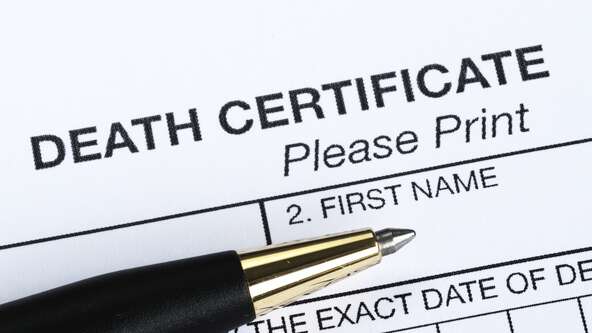

Death certificates are the only legal proof of someone’s passing. Closing accounts, probating an estate, and dozens of other necessary tasks would be impossible without them. Get answers to the most frequently asked questions, including how, when, and where they’re issued.
Almost every funeral professional receives questions about death certificates more than any other topic. Families need these legal documents to settle a loved one’s estate, file life insurance claims, access pension benefits, and apply for Social Security benefits, among other necessary tasks.
Below are the most frequently asked questions about death certificates.
A death certificate serves as legal proof of a person's death, and it is required for various purposes, including:
Additionally, public health departments rely on death certificates to compile data on various statistics, including leading causes of death.
Usually, the funeral home, cremation service, or mortuary will prepare and file the death certificate. Although the exact process varies depending on the jurisdiction, deaths must be registered with the local or state registrar or vital records office within five days or sooner.
However, immediate family members or legal representatives can request a death certificate. Requirements may vary depending on the jurisdiction.
The processing time for a death certificate can range from a few days to several weeks, depending on the state or county issuing agency. Some jurisdictions offer expedited services for an additional fee. While most funeral providers order death certificates for you as part of their service, they cannot control how long it takes the state or county to issue, process, and mail them.
Some counties issue a “pending” death certificate so the funeral home or cremation service can proceed with final disposition without further delay.
Understandably, there are several steps in preparing, filing, processing, and issuing a certified death certificate. Insurance companies, banks, and other institutions understand that it may take up to several weeks before you can settle a loved one’s estate.
However, you can do a few things to shorten the process.
Check the options for expedited service. Some issuing agencies allow you to pay extra for expedited service.
Apply in person. Going to the vital records office in person might be quicker than ordering online or by phone.
Select the fastest payment method. Most government agencies have secure online ordering systems. You can shorten the process by paying with a credit or debit card than with a check or money order.
Provide complete and accurate information. Make sure your request is complete, accurate, and signed. Otherwise, the agency will return the incomplete or incorrect form to you, and you must start over.
Follow up on your request. Follow up after you allow a reasonable time for your request to be processed. Refrain from repeatedly calling: agency employees are often swamped with requests.
Consider using a private service. Some private services claim they can obtain a death certificate faster – for a fee. However, an outside or private firm cannot issue a death certificate. They must wait with everyone else for the official agency to complete the process.
Your state or county, not the funeral home, decides how much to charge for a death certificate. Fees can range from $6 to $25. Generally, the first copy is the most expensive, and subsequent copies (for the same person) cost less.
Your funeral provider can advise you, but you should request at least five to seven copies. Some institutions accept photocopies; others require an original certified copy. You can order additional documents if needed.
Death certificates generally include the following information:
Some governmental or financial agencies require a more detailed (also called long form) death certificate that lists the cause of death. Most places ask for a copy of the standard death certificate (also called a short form), which does not have the cause of death or sensitive medical information.
Death certificates do not have an expiration date, and their validity remains indefinitely. However, for specific purposes, such as claiming life insurance benefits, some organizations may require a death certificate issued within a particular time frame.
In most cases, you can still obtain a death certificate if the death occurred outside the country. You must contact the embassy or consulate of the country where the death occurred for assistance and follow their specific requirements.
You can typically request an amendment if there is an error on the death certificate, but you might need legal assistance. The process for amending a death certificate varies by jurisdiction, but it usually involves submitting a formal request and providing supporting documentation.
All deaths must be registered with the proper authority, including for an infant or stillborn. A stillborn baby is defined as one who shows no signs of life at the time of delivery.